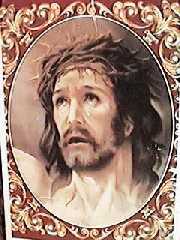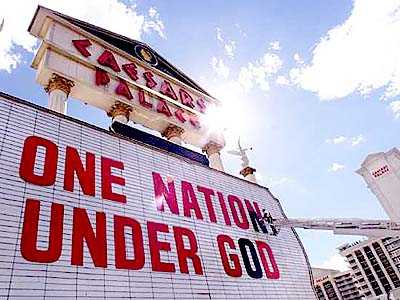 A response to What Jesus Said—specifically, to the following quote:
A response to What Jesus Said—specifically, to the following quote:
 A response to What Jesus Said—specifically, to the following quote:
A response to What Jesus Said—specifically, to the following quote:
When telling of the judgment of the "nations" (ergo political), Jesus said, according to Matthew's Gospel: "For I was hungry and you gave me food . . . I was a stranger and you welcomed me, I was naked and you gave me clothing, I was sick and you took care of me, I was in prison and you visited me. . . . Truly I tell you, just as you did it to one of the least of these my brothers . . . you did it to me." It sounds to me like welfare, open immigration, universal health care, increased international aid and prison reform, all in one sermon.
Los Angeles Times, 2001
The source for the Biblical passages is Matthew 25:35-41. Now let the debate begin:
Rob...missed the point?
A correspondent tackles my argument:
>> No disrespect but, I believe you miss the point. That parable is simply showing that those who "believe" they do all things for the Master, are not the ones whom the Master choses. It is those who did not know they had done anything for the Master that he took into his kingdom. <<
A few points:
1) I took the words from an op-ed article. They weren't mine, though I support their implications.
2) Almost every word of the Bible is open to interpretation, much to the chagrin of fundamentalists who would wish it otherwise.
3) No one said Jesus was laying out his own political agenda. Most of the time he was apolitical: "Render unto Caeser..." and all that. The author merely implied that Jesus's words supported or justified a liberal political agenda.
If Christians in today's political environment want to keep their views to themselves, not impose them on others, no one will need to analyze the Bible for its messages. But "President" Bush has done the opposite—wearing Jesus on his sleeve, so to speak. He's advocated faith-based charity funding and school-led prayer.
Since he and other right-wingers have put the Christian faith into play in the political arena, it's our right—nay, our duty—to assess what Jesus's agenda would be. My view is that the author accurately summarized the positions Jesus would take. That makes Bush an anti-Jesus hypocrite.
That's most evident in his cheerful support for executions. But Jesus would be aghast at much of the Republican agenda. He'd denounce it just as he denounced the conservative money-changers of his time.
Speaking in Jesus's name, the Pope, the US council of bishops, and other religious leaders have rightly criticized many of our political and social practices. Foremost among them is the whole capitalist cult of competing, spending, and acquiring—which is the basis of America's culture. These leaders are appalled and I suspect Jesus would be too.
Do not store up for yourselves treasure on earth.
Jesus in Matthew 6:19
>> If you think capitalism is so evil, why do you stay in this country? <<
All countries practice capitalism to varying degrees, so there's no escape from it. And capitalism does as much good as evil, so I don't want to escape from it completely. The difference is that I recognize the evil as well as the good, unlike some people.
Actually, I've vaguely wondered what it would be like to live in a country with a better quality of life—e.g., Sweden, Norway, Canada, or Australia, according to a recent report. But I'd have to have a huge impetus to relocate to another city or state, much less another country. Maybe if a beautiful and brilliant woman implored me to move.... <g>
>> I don't take Jesus' comment as having anything to do with capitalism. I believe he is talking about "spiritual treasure." <<
"Do not store up for yourselves spiritual treasure on earth"? What the heck could that mean? What's a spiritual treasure and how do you store it?
I think he meant treasure of all sorts, since he didn't qualify the word. That included physical treasures such as money and property. Don't focus on material goods, as he said in other contexts. Focus on living a godly life (with humility and charity toward all).

The debate continues....
>> Nothing Jesus did or said, is, in any way political. Everything Jesus did, and spoke about, IS connected to the Mosaic law and the Prophets. <<
I wouldn't go that far. I don't think he meant to challenge political institutions overtly, but most wide-reaching philosophies have political implications. IOW, his words implied a political agenda, even if he didn't profess one. And since his words and actions led to profound change within the Roman Empire, they did have political implications, whether he professed them or not.
Besides, you ignored the original commentator's point about "nations." Jesus "will sit in state on his throne, with all the nations gathered before him" (Matthew 25:32). Sitting "in state" and addressing "all the nations" are political acts. Apparently Jesus meant his words to apply to all spheres of life, including political activities—not just spiritual activities.
>> But the fact is, NO human being is capable of separating themselves from their "beliefs." Bill Clinton couldn't do it and GW can't either. No one can!! <<
I agree, which means that criticizing someone like Dubya Bush or John Ashcroft for his right-wing religious beliefs is fair game.
>> And my point is, Jesus said nothing about politics. <<
I wouldn't go that far, either. When he said things like "Render unto Caeser that which is Caeser's," he's saying something about politics and religion being separate. I wouldn't call that a political agenda, but it is a political statement. It denies people should bring religion into politics, which itself is a political position.
Jesus reinforced this idea when he said people shouldn't make a show of praying in public. Again, he suggested, using religion to further a non-religious agenda is wrong.
>> Any use of Jesus' words in the political arena is just plain inappropriate. <<
Tell it to the right-wingers who routinely parade Jesus as if he were their personal standard bearer. If they bring his beliefs into play, the rest of us can and should respond.
>> What Jesus denounced, in a very clever way, is the Mosaic law. The law which Jesus was sent by God to fulfill. The law which is commonly known as "God's law." <<
He denounced much more than that. His line about moneychangers comes readily to mind, as do his many words and actions supporting the poor. Again, these have political implications, if they're not overtly political.
The parable of talents
>> You might be interested in reading the "parable of talents" found in Matthew 25:14-30. I believe this parable supports capitalism in every way. <<
No, it supports the idea of hard work, nothing more. But if you're right, you've just disproved your own thesis that Jesus said nothing political. The choice of economic systems is profoundly political and has myriad political implications.
>> I do most certainly disagree with the Pope. For Catholicism is no different from other sects of Christianity in its "support" of the first covenant law. The law which Jesus condemned. The law which Jesus fulfilled. <<
I'll have to go with the Pope's understanding of Christianity over yours. Together, he, I, and the US council of bishops have studied Christianity many, many years more than you have.
>> I would like for you to re-read the parable of sheep and goats [Matthew 25:31-46]. It is from this parable that you quoted that inspired me to respond to your post in the first place. <<
Then it's odd you're disagreeing with me, since this parable supports my contention completely. Those who give (not sell) food to the hungry, clothes to the naked, etc. have Jesus's blessing. "The curse is upon" those who don't. This parable explicitly supports the idea of giving to those in need without regard for their financial means. It's a crystal-clear justification for a society based on compassion and other communal values rather than the ruthless pursuit of profits.
It's a lot clearer than the previous passage you cited in Matthew. Jesus praised the man who turns five bags into ten and the man who turns two bags into four with exactly the same words. That tells us Jesus did not support the idea of maximizing one's profits, which is the foundation of capitalism. He did support the idea of work, which is the foundation of every known political, economic, and cultural system.
>> The goats BELIEVED that they had done everything in service to the master!!!!!
Now ask yourself, who is it in this world today that "believes" they are doing the work of God?? <<
Pretty much everyone does, but especially the rabid Christian right wing. So what's your point? Do you think Jesus supports you more than others because you "believe" you're doing his work? Or that he supports those who don't believe they're doing his work?
It doesn't matter. Unless you're doing his work by giving to the poor and naked, you're not doing what he explicitly said to do. Your actions are what matter, not your professed beliefs.

The debate continues....
>> But the fact is, Jesus didn't challenge the political leaders. It was only the Pharisees and Sadducees that Jesus challenged. Only those people who were under the Mt. Sinai covenant law. <<
Jesus may not have challenged political leaders directly, perhaps because he was too busy challenging religious leaders. But his message had profound political implications, as I said. It was consistent with a political agenda.
And there's evidence he did intend an overt challenge to political institutions. From the Guardian, 9/11/01:
Vatican Scholars Prepare to Rewrite the Bible
Vatican scholars are preparing to rewrite the Bible by incorporating revelations contained in ancient scrolls discovered beside the Dead Sea in Palestine, it emerged yesterday.
A team of theologians and historians will gather in Italy later this month to start the potentially explosive task of inserting new details about the life and times of Jesus Christ.
The influence of radical Jewish groups who wanted to overthrow Roman rule is likely to feature in the new Bible, bolstering those who interpret Christ as a revolutionary who fought political oppression.
>> Again, he suggests, using religion to further a non-religious agenda is wrong.>>
I agree!! <<
Then you agree his message had profound political implications, whether he challenged political leaders or not.
>> If they bring his beliefs into play, the rest of us can and should respond.
The trouble is, they distort Jesus personal standard in order to forward their agenda. <<
They don't agree they're distorting his standard. No one ever agrees with that. It's up to the rest of us to point out the distortions.
>> For example: Why did Jesus not heal all of the folks who were at the pool of Siloam? Yet we only hear about the one man he did heal from the Christians. <<
You might as well ask why God didn't make the Garden of Eden perfect, without a serpent or an apple. God had some stupid idea that we should suffer and die, so he made it happen. Jesus was just following God's lead: letting people suffer to teach them abstract lessons when helping them would've been the moral thing to do.
>> The moneychangers were in the temple, not the courthouse!! <<
Moneychanging is generally a commercial act, not a religious act. It's supported by political processes such as coinage and usury laws regardless of where it happens.
Besides, Jesus made countless statements that apply to all people, not just to the Pharisees or moneychangers. "Do not set yourself against the man who wrongs you" and "love your enemies" apply to all spheres of life: religious, political, and economic.

Christianity doesn't follow Scripture
>> The problem is, the religion/Christianity they have created doesn't hold up to the scripture. <<
The religion they've created hasn't followed Scripture for many centuries. With his recent comments denouncing capitalism and supporting social justice, Pope John Paul II is finally moving the Church back toward Scripture, however cautiously.
>> I encourage you to reread that parable. For the goats are the very ones who believed they had done all of those things in the name of their master. The sheep didn't know they had ever done those things. Read it again my friend. <<
I've read it and understand it. Jesus divides the world into two groups, sheep and goats. He tells people to emulate the sheep, not the goats, if they want to go to heaven. What part of it don't you understand?
If you're seriously arguing that the parable's point is that Jesus rewards only those who act unknowingly, you seriously need to read it again. In my version of the Bible, there isn't one word about acting knowingly or unknowingly. The speaker is narrating what Jesus will say when he comes. What Jesus will say is how sheep and goats should act to join him in the Kingdom of God. They won't have to guess because they'll have heard Jesus's admonitions to help the needy.
If you have a different interpretation, find it in the text. My version has Jesus telling the sheep how to act. How they should act is to feed the hunger, house the homeless, clothe the naked, etc. If they follow Jesus's explicit instructions, they'll reach the promised land.
>> As a matter of fact, I believe EVERY human being does do the work of God, those who do good and those who do evil. <<
That's an interesting position. I'm not sure how it's relevant to this discussion, unless you're trying to excuse the actions of evildoers. Most people think they're doing God's work, but clearly—if you read the Bible—they aren't.
>> IOW, Judas Iscariot did the work of God by betraying Jesus to the Pharisees. Judas was just as righteous [right with God] as Jesus Christ. <<
I suppose Hitler was doing God's work too? He may have thought he was, but no one else does.
If you believe Hitler was doing God's work, we might as well toss the Bible as worthless. We can go by my morality instead, since I don't think everyone is doing God's work. America's political conservatives violate God's and Jesus's commandments routinely, in my God-like but humble opinion.
Rob
P.S. Naturally, I don't agree with some of the Bible's so-called morality. Jesus was one mixed-up guy, as the posting Why Jesus? shows. His daddy God wasn't too swift either.

The debate continues (8/22/02)....
>> If we stop and think about it, "everything" is both political and religious. There is NO way to avoid that. This fact still applies in our world today. It is impossible to separate religion and politics. <<
Thanks for contradicting your earlier point, when you said, "Nothing Jesus did or said, is, in any way political." Too bad you didn't admit I was right at the beginning. It would've saved a lot of time.
>> Any/every serious message has both religious and political implications. <<
Again, you contradicted your earlier claim when you said, "Jesus said nothing about politics." Thanks for finally seeing the light.
>> Which goes to show us that two people can hear/read the same text and get two distinct and different messages from it. We "hear" based on what we already "know." This is the reason Jesus said, on more than one occasion, let he who hath ears to hear, hear. Jesus knew people would draw incorrect conclusion from his messages. <<
Yes...as you've done with your incorrect interpretation of the parable of the sheep and goats.
>> But the moneychangers were operating in the temple. <<
They were performing a commercial act in the temple. A commercial act is "supported by political processes such as coinage and usury laws regardless of where it happens."
>> Besides, Jesus made countless statements that applied to ALL people, not just to the Pharisees or moneychangers.
I must disagree with you!! From outward appearances it might seem that the things Jesus said was meant for all people but, when his words are weighed against the Mosaic law, a whole different picture emerges. <<
"From outward appearances it might seem that the things Jesus said was meant for all people"...stop right there.
"When his words are weighed against the Mosaic law, a whole different picture emerges"...but apparently you can't explain the different picture. So noted.
>> I'm not sure how you figure denouncing capitalism and supporting social justice is following the scripture more closely? <<
Because Jesus denounced the accumulation of riches, which is the basic goal of capitalism.
>> He tells people to emulate the sheep, not the goats, if they want to go to heaven. What part of it don't YOU understand?
You're mistaken my friend. Jesus doesn't tell either of them how to act. <<
As I said, "The speaker is narrating what Jesus will say when he comes. What Jesus will say is how sheep and goats should act to join him in the Kingdom of God." If you disagree with any words in this sentence, state exactly which words you disagree with and why.
>> I encourage to you re-visit that parable. <<
I did. My interpretation is still right; yours is still wrong.

No such thing as evil?
>> First thing is, "evildoers" is in the eye of the beholder. <<
So you agree that Hitler and Osama bin Laden weren't evil?
>> Second; "evildoers" are JUST as important to the "plan of God" for his creation, as those who do good things. <<
Yes, well, God did let 9/11 happen. I'm happy to blame him for it.
>> Yes, I do believe Hitler was doing the work of God. And the fact is, I came to this belief through studying the bible. <<
And God's work was...killing six million Jews? Are you seriously arguing God wanted all those people to die?
>> The very thing that separates man from God is, man's morality is quite different from God's morality. <<
Yes. According to you, my morality is better.
>> But the "commandments of God" don't stand alone. They are simply a part of a much larger document. A document knows as The Mosaic Law. <<
Isn't Mosaic Law all part of the Bible? If it's not, it's irrelevant to most Christians. Devout Christians tend to go by what's in the Bible only.
>> Have Fun........Be Happy <<
I'm happy. I've won another argument.
Rob
|
. . . |

|
All material © copyright its original owners, except where noted.
Original text and pictures © copyright 2007 by Robert Schmidt.
Copyrighted material is posted under the Fair Use provision of the Copyright Act,
which allows copying for nonprofit educational uses including criticism and commentary.
Comments sent to the publisher become the property of Blue Corn Comics
and may be used in other postings without permission.